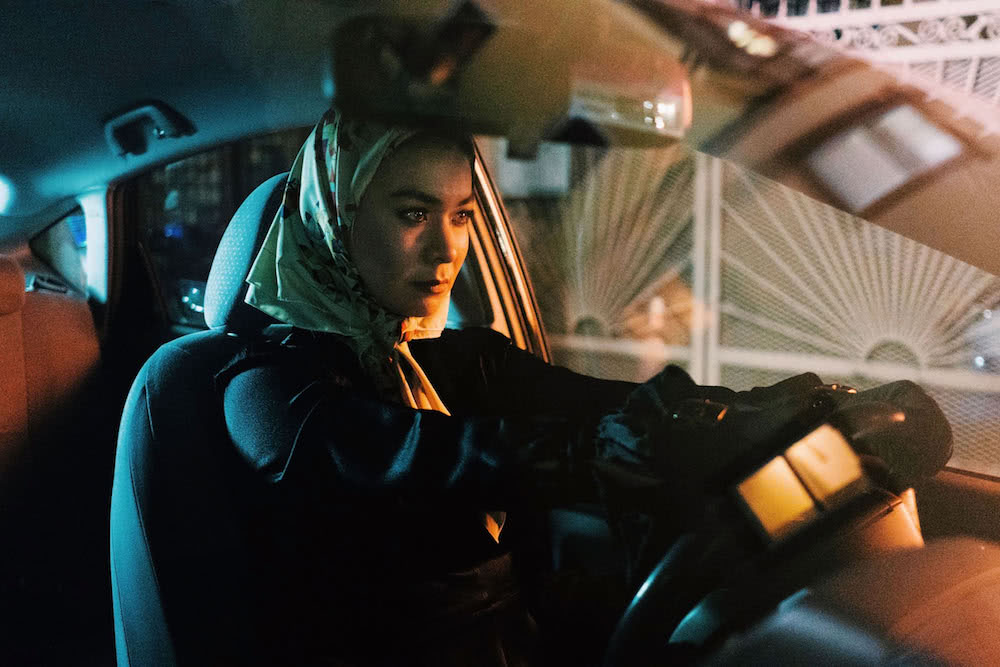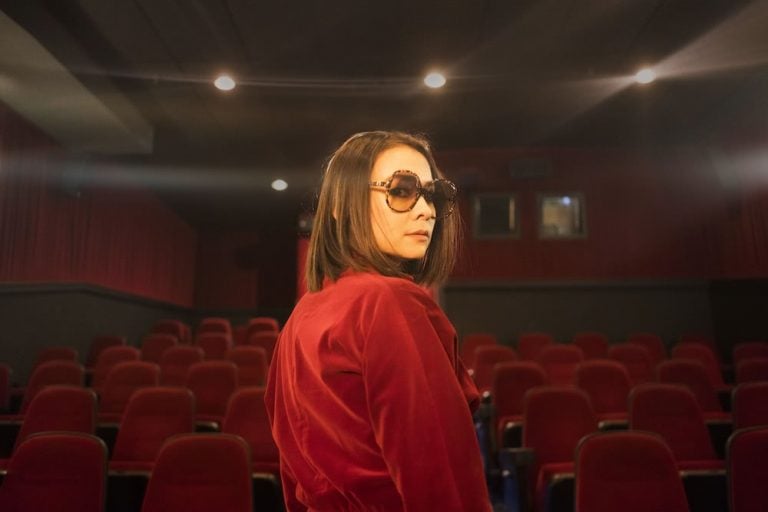There’s a line on ‘Nobody’, one of the first singles released from new Mitski album Be The Cowboy, that has stuck with me since I heard it. “I know no one will save me / I just need someone to kiss” is a kind of quintessentially Mitski lyric, encapsulating the pursuit of some impossible elusive feeling that, no matter how ephemeral, will be worth the chase.
For this, the fifth album from Mitski Miyawaki, loneliness is perhaps a more central songwriting topic than in any of her previous work. Be The Cowboy a thorough examination of the ways in which a sense of isolation can embed itself in someone, and what that looks like in relation to intimacy; to vulnerability.
Having toured near-constantly for years, Mitski wrote much of Be The Cowboy while on the road. “I’ve been basically on tour the entire time between now and when Puberty 2 came out, and before that too,” Mitski says. “And so, time goes by really fast. I don’t get as much of an opportunity to sit down and write because I’m always on the go. It’s writing around my reality, which is constant touring.”
As one might expect of that particular lifestyle, there’s a certain loneliness that is practically built into its ecosystem.
“I think it’s definitely coming from a place of being on the road constantly,” Mitski says. “But it’s less of a personal loneliness and more of a sort of structural and a sort of societal loneliness. When you’re on tour, you’re surrounded by people all the time, but your daily schedule is completely different from everyone else in the world.
“You’re always in a different country, city, time zone. You’re always far from people you might love… it’s hard to find a sense of community, and your experiences are just so vastly different from everyone else’s. That’s the kind of loneliness. It’s not so much physical – because you are surrounded by people – but it’s a very solitary lifestyle.”
Watch the clip for ‘Nobody’ by Mitski below
Love Music?
Get your daily dose of metal, rock, indie, pop, and everything else in between.

Mitski’s career began with her self-released 2012 debut Lush, a primarily piano-driven record that laid the groundwork for her future material alongside Retired From Sad, New Career In Business the following year. Both albums were recorded while Mitski was studying music at Purchase College in New York, and have more in common with chamber pop than the guitar-heavy indie rock of her later work. 2013’s Bury Me At Makeout Creek was many listeners first exposure to Mitski, but it was the 2016 album Puberty 2 that solidified her presence as a bona fide indie star, receiving widespread acclaim.
“I can afford Ubers now when I need them, that’s about it,” she says when enquired about how life has changed since the album’s release. However, in March, Mitski – who recently received praise from Iggy Pop – embarked on a slew of dates supporting Lorde alongside Run The Jewels, in some of the largest venues she’s ever performed at.
“Oh my gosh, it was such a great learning experience. I’d never played in an arena before and those are completely different beasts. So many more people, and everyone’s so much further away. And behind the scenes there are hundreds of people making the show happen. Every day, at arena shows, the crew comes in early, around dawn, and just starts building the stage from the bottom up. The universe of the show is created every day and that was amazing to see.”
As she’s grown more popular, Mitski has developed into a kind of icon for emotional honesty; of openly confronting the feelings that many would rather push down. There is something of a universal understanding among her fanbase with regards to the affecting nature of her songs – the sort where saying you’ve been “listening to a lot of Mitski lately” serves as a genuine answer to being asked how you’ve been.

For many, there is a connection there that is unlike many other songwriters – the lyrics on a Mitski album feel at once intimate and deeply, deeply relatable. Last November, she tweeted: “i may not have a religion to keep me in check but I do have people with tattoos of my lyrics who will forever have an embarrassing band tattoo if I do anything dumb, god bless”.
That said – if listeners are connecting to the work, Mitski is doing the same. Be The Cowboy’s first single (and album opener) ‘Geyser’ reads like it’s about romantic devotion, but is in fact a kind of love letter to the act of songwriting itself. “I will be the one you need / the way I can’t be without you,” sings Mitski, The track opens with a glitchy synth that can be jarring on first listen. “That was Patrick’s [Hyland, producer] idea. He tends to be much more liberal with torturing the listener than I am. I tend to want to be kind but he’s like, ‘No, they can take it.’
“The idea is that it’s an album opener and it’s kind of like a challenge to the listener. Are you in or are you out? Can you take this? If you don’t want to that’s fine, but this is your cue.”
It’s an apt ultimatum for an artist like Mitski. While on the surface, her music is coated in a fairly inviting pop veneer, there’s an intensity that dwells just beneath. Personally, the moment Mitski’s music clicked with me most profoundly was listening to Makeout Creek cut ‘I Will’ on repeat while crying on a crowded city bus. For the record, I’m a firm believer and advocate in crying on public transport; there’s something about leaning into that feeling of vulnerability despite knowing on a rational level that it’s not maybe ideal.
That’s kind of what Be The Cowboy feels like – there’s a kind of confidence found in the messy, the imperfect, the mortifying throughout the album. On one track, Mitski narrates preparing to meet up with presumably a former love, so that she can “win” and gain a sense of closure – “Spend an hour on my makeup to prove something / walk up in my high heels all high and mighty / then you say hello, and I lose.”
It’s scary to let go of something you identify so strongly with.
However, if fans are looking for another album to cry to, they may be somewhat disappointed. While much of Mitski’s music has revolved around a deep, all-powerful sense of longing, Be The Cowboy acknowledges these realities through a far more critical lens. If earlier work saw her being confronted by those feelings, this album sees her on an even playing field with them. Acknowledging them, maybe even indulging them, but never in a way that feels helpless.
Watch the video for ‘Geyser’ by Mitski below

“I think a common theme on this album is having no use for something that’s toxic in you or in your life but still holding onto it, because you’ve just had it for so long, or it’s all you know,” explains Mitski. “It’s scary to let go of something you identify so strongly with”.
It makes sense, then, that the album’s title is a shortened version of a kind of inside joke mantra Mitski would repeat to herself when feeling uncertain – “be the cowboy you want to see in the world”. That cocksure approach of responding to things that are overwhelming is a presence felt throughout the album. Oh, things are rapidly deteriorating and falling apart? Who cares.
This is visible not just on the lyrical content of the album, but the musicality itself. Tracks like ‘Washing Machine Heart’ and ‘Why Didn’t You Stop Me?’ trade in any hint of demureness for goth-disco aesthetics, while ‘Remember My Name’ and ‘Me And My Husband’ roll with a kind of confident self-assured swagger.
The point of my writing is that I want to express a feeling and what exactly happens in my life is not important.
On Be The Cowboy, Mitski intentionally experimented with narrative fiction to provide the lyrical backdrops – a conscious effort to critique the lazy way in which music by women is immediately categorized as confessional and raw. There’s an assumption that’s regularly made about the extent of the autobiographical nature of songs by artists like Mitski, and while her songs have become associated with emotion and vulnerability to a semi-ubiquitous level, it’s a folly to assume that there’s no craft, no genuine narrative-writing behind any of it.
“I think I made a point of writing things that obviously didn’t happen to me because I wanted to make a point of the fact that [these descriptions] of my music are very gendered. I wanted to express the fact – look, I am writing what’s true to me, but it is a craft.
“I am creating these things and editing them, I’m thinking about them. They’re not just flowing from me, and I have some authority over what I make. I think that’s where it came from. Just because it’s a narrative that didn’t specifically happen to me doesn’t mean it isn’t true to me. The point of my writing is that I want to express a feeling and what exactly happens in my life is not important. If using a character or something that didn’t happen to me is what best describes a real feeling I had, I’m going to use that.”
Watch the video for ‘Two Slow Dancers’ by Mitski below

Be The Cowboy is the fourth Mitski record produced with longtime collaborator Patrick Hyland – a continuation she explains is largely a matter of efficiency. “We’ve worked together so much that at this point we can kind of predict each other’s movements; we already know how we each work. There’s a lot of non-verbal communication where we can just work faster and I’ve come to depend a little on that.
“He’s very much a recording engineer, he gives me my space. I tend to kind of go crazy when I’m making a song. He allows me whatever process I have; he’s just very accepting and open and allowing of things, and I think that’s why I keep going back to him. He makes a really hard process as easy as possible for me.”
Listening to Be The Cowboy, one can’t help but notice how much Mitski is able to make with relatively little. There are 14 tracks over the album’s half hour, most of which clock in at around the two minute mark, and each feels as vital as the rest – it’s all killer, no filler. It’s a recurring element of Mitski’s work; many of her most succinct, stripped back tracks contain more potency than any bearded pseudo-troubadour’s sprawling, 6 minute wankfest.
“For most of my life, I’ve been someone no one wanted to hear,” she explains. “I’m not really the kind of person anyone turns to for an opinion. Maybe if I were a straight white guy I could noodle for 45 minutes and everyone would be like, he’s a genius… but that’s not my reality.”
Acknowledging this reality, Mitski says she began learning over time to try and fit in all that she was trying to communicate through the brief window in which she has a listener’s attention. “Without really intending to, I kind of trained myself to be incredibly concise”.
In both its sound and subject, Be The Cowboy feels like a natural progression from Puberty 2. If there’s one thing to take away from the album, it’s that the good stuff is to be found in embracing – not shying away – from what feels uncomfortable, or difficult to talk about. Be the goddamn cowboy you want to see in the world.

































